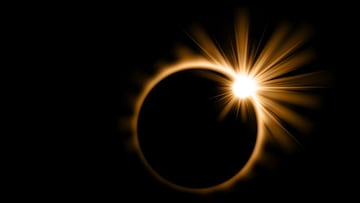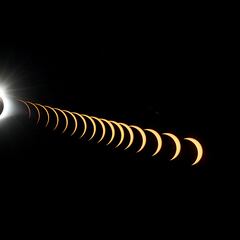This is the new technology that will help blind people hear and feel the 2024 total solar eclipse
Millions of Americans will turn their gaze to the sky on 8 April for the total solar eclipse. A device will let those without sight enjoy the event too.

People across much of North America will have the opportunity to witness one of the most magnificent celestial events on Monday 8 April. A second total solar eclipse in seven years will sweep across the United States, and this one is expected to be even better than the last.
At its maximum, viewers in the right place will be in the path of totality, where light from the Sun is completely blotted out except that of the corona, for nearly four and a half minutes. Those who are blind or visually impaired will also have a chance to experience the celestial event with the aid of a sound and touch device.
This is the new technology that will help blind people hear and feel the 2024 total solar eclipse
The LightSound device was designed and developed in 2017 through a collaboration between Harvard astronomer Allyson Bieryla and Wanda Díaz-Merced, an astronomer who is blind. That prototype was used to help members of the Blind and Low Vision (BLV) community experience the solar eclipse that crossed the US from west to east with sound.
The handheld device was redesigned to improve sound quality and 20 devices were distributed across Chile and Argentine for the 2019 South American eclipse.
When the sensor on the LightSound device is under normal light, it emits a high-pitch musical tone. The pitch gradually drops as the Moon progressively blocks the Sun’s light. When the light is completely blocked it begins emitting a series of clicking noises until the sensors pick up light again. Then the process reverses going from a low-pitch musical tone like a clarinet to high-pitched flute. Users can plug headphones into the LightSound device or connect it to a speaker for group listening.
City of Eagle Pass has received lightsound devices from the LightSound Project, so that the blind and visually impaired community can experience a Solar Eclipse through sound! We are thrilled to include sound stations at our viewing sights to create inclusive experiences for all! pic.twitter.com/Laz02JXg2y
— OfficialCityEaglePassTexas (@CityEaglePassTx) March 13, 2024
LightSound Project is completely open source and provides downloadable DIY instructions in English, Spanish and French on how to build your own device.
Related stories
The project had a goal of building more than 750 devices in conjunction with other institutions in time for the April 2024 total solar eclipse. The project donated over 200 devices prior to the annular eclipse in 2023 over North America.
Several listening events are planned for the Monday 8 April from Colombia to Canada, and across the Carribean. There are many locations along the path of totality in the United States. You can check the LightSound Project website to find one of them and get contact information.



Complete your personal details to comment